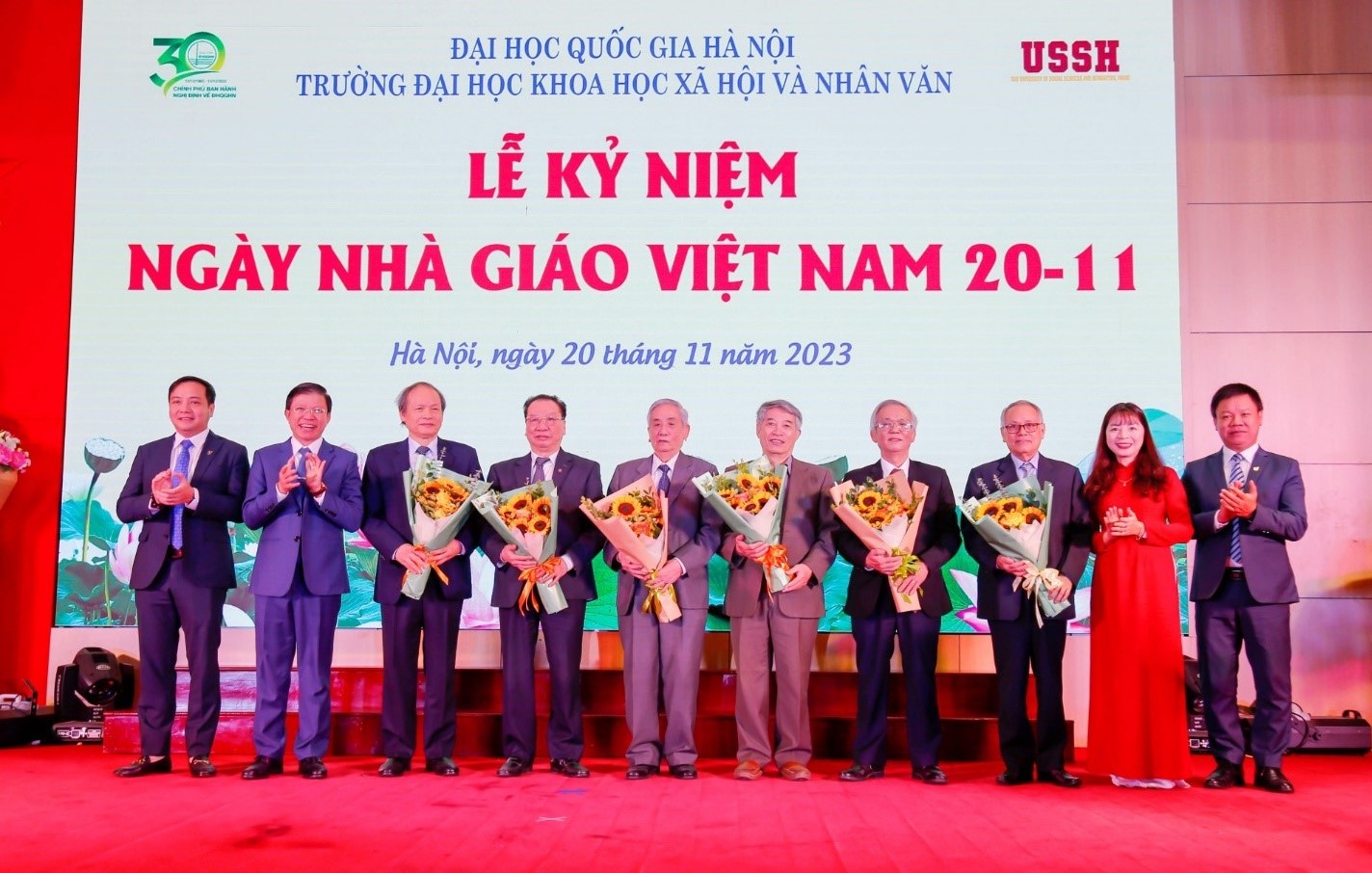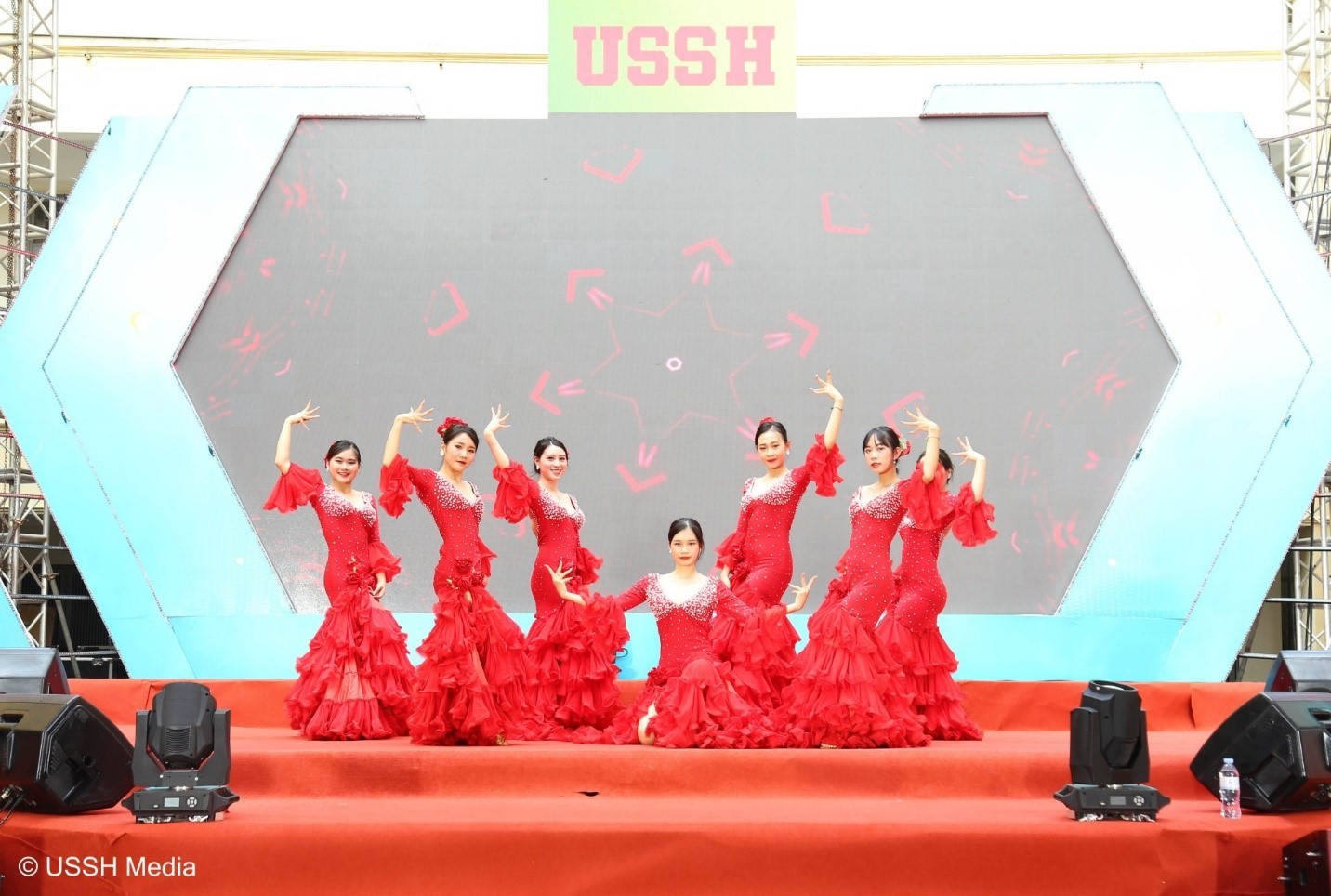The University of Social Sciences and Humanities was supported by VNU to renovate on the occasion of the 30th anniversary of the Government's Decree on VNU.
Firmly adhere to basic scientific philosophy
In forums, you always emphasize the fundamental role of basic science. How is this philosophy reflected in the structure of the School?The University (1956-1995), the predecessor of today's University, was a famous and internationally prestigious center of basic science. The philosophy of basic science continued to be nurtured when the University of Social Sciences and Humanities was established in 1995 to operate within the structure of VNU.
The philosophy of basic sciences not only continues in traditional training and research fields (Literature, Linguistics, Philosophy, History, etc.) but also permeates the training fields that were formed later. Even highly applicable training programs (Office Administration, Hotel Management, Management Science, Information Management, etc.) all have a relatively large number of foundational subjects from the field of basic sciences.
For example, students majoring in Journalism will be equipped with a background of knowledge about culture, history, language, politics, ideology, etc. before (or in parallel with) being equipped with in-depth knowledge about communication and journalism. Basic scientific knowledge and interdisciplinary methods are the foundation to ensure that students after graduation can continue their studies or self-study during their work.
Basic science is very important but is currently facing many challenges. What solutions does the school have to continue promoting it, sir?The good news is that the basic science majors of the School are all being recruited very well: the competition rate is high, the entrance score is very high (in 2023: the entrance score of Philosophy is 25.30 points, Literature is 26.80 points, History is 27.00 points...).
VNU has issued a strategy on basic science, which serves as a foundation for the University's policies. Currently, VNU and the University are investing in scholarships (50 million/year) and scientific research funding (10 million/topic) for students in 09 basic science majors.
Some basic science fields of the University are closely linked to national responsibilities, so it is necessary to be steadfast in its development philosophy. For example, there are only a few units nationwide that train in the field of Archaeology, and each year the country has no more than 10 bachelors, of which about 50% graduate from the School of Humanities. The cost of training a bachelor of Archaeology is on average 10 times higher than the cost of training bachelors in other majors because it has to invest in internship activities (long-term excavations in the locality) and experiments (restoration, sample testing)... However, the University is still steadfast in its mission of training and researching specific basic science fields because in addition to the scientific significance itself, it also carries a national - ethnic mission, especially in fields that the country cannot do without, such as Han Nom, Ethnology, Religious Studies...
The school is currently trying to balance its own resources to invest in basic science, but in the long term, specific basic science fields need more investment resources from the State.
The Board of Directors of the University of Social Sciences and Humanities presented flowers to express gratitude to former leaders of the University through the periods on the occasion of the anniversary of Vietnamese Teachers' Day 2023.
Creativity and innovation do not exclude academia
The school is not only very academic but also strong in creativity and innovation?That’s right! The rapid changes in higher education pose enormous, even dire, challenges to the social sciences and humanities. Without adapting, the University will have difficulty surviving, let alone developing.
Changing towards creativity and innovation must become a very natural attribute of educators in general. At the School of Humanities, innovation and integration do not exclude academic considerations, and are not contrary to the basic philosophy of science. Applying technology to teaching does not take away from professional expertise, because specialized knowledge has permeated the minds and hearts of teachers; technology contributes to better conveying teachers' knowledge to students, making teaching and learning activities more dynamic and more suitable for Gen Z students who love technology. Applying technology and applying modern methods to research contributes to improving the quality of scientific products and shortening the implementation process.
Similarly, university administration and public service must also innovate in the direction of technology and service spirit, and cannot remain "bureaucratic" forever.
Saying “student-centered” requires corresponding actions, not just empty slogans. If we do not change to adapt, we will be lost in front of students and eliminated in our own playing field.
The School of Humanities is not only strong in basic sciences but has recently also been very active in startups, digital capabilities…?When the Covid-19 pandemic broke out, the School of Humanities was among the pioneering higher education institutions in applying technology for online teaching and learning, and was awarded a certificate of merit by the Ministry of Education and Training.
Many people were surprised when Meta Group (Facebook) decided to sponsor the School of Humanities to implement the Project “Digital Competence for Vietnamese Students” in 2021-2022. As a result, the first set of learning materials in Vietnam including textbooks, handbooks, and monographs on “Digital Competence” was compiled and used by more than a hundred universities in Vietnam.
In November 2023, Dao Minh Quang Foundation (Germany) signed a sponsorship agreement for the School of Humanities to develop a standard set of learning materials on "Startup", including textbooks, manuals, video lectures, libraries, incubators, etc. If completed in 2024, this will be the first set of learning materials in Vietnam on startups for Vietnamese students and youth.
Thus, along with the in-depth scientific research activities that have made the reputation of the School as a "research university", innovation activities have contributed to shaping the position of the School of Humanities today: still academic but full of integration, still academic but not out of place with the contemporary digital university.
Creativity and innovation, therefore, do not exclude but on the contrary increase the academic character of the School!
Classical dance performance by Humanities students: a harmony between professional expertise and modern skills
Quality human resources are the key to success
It is known that the School is investing heavily in developing its staff. Can you share about this issue?
Human resources play a key role in every innovation. Quality human resources determine the reputation of the School of Humanities.
The quality of teaching and research staff (about 75% have standardized doctoral degrees and 20% have been awarded the title of professor/associate professor) is an important resource. For many years, to support staff in standardizing their academic titles and degrees, the School has "individualized" training activities for each staff member: providing basic scientific topics, supporting translation; supporting international publications (70 million/international article in group Q1; 350 million/monograph in group A of SENSE), supporting staff to study abroad... The School's direct investment in developing scientific staff has increased by about 400% in the past 2 years.
The administrative staff is also regularly trained in skills and updated in knowledge, ensuring the spirit of "professionalism, friendliness, efficiency"!
What do you expect from investing in staff development?
Uncle Ho, who signed the decree to establish the Faculty of Letters (1945), the predecessor of the University of General Sciences (1956-1995) and the University of Social Sciences and Humanities (since 1995), once said: "Cadres are the root of all work".
At the School of Humanities, a team of highly qualified staff, modern methods, and a positive attitude will be the universal key to open the doors to further success. With quality scientific human resources, there will certainly be new training programs, major research projects, and cutting-edge scientific products; with quality administrative and civil service human resources, there will certainly be a modern and effective university administration...
In reality, no leader can think of everything and do everything; when 500 Humanities staff are proactive, creative, and focused, their own resources will be many times stronger. Therefore, the School will continue to firmly invest in the development of its staff, creating a solid foundation for the comprehensive development strategy of the unit in the next stages.
Thank you very much!


